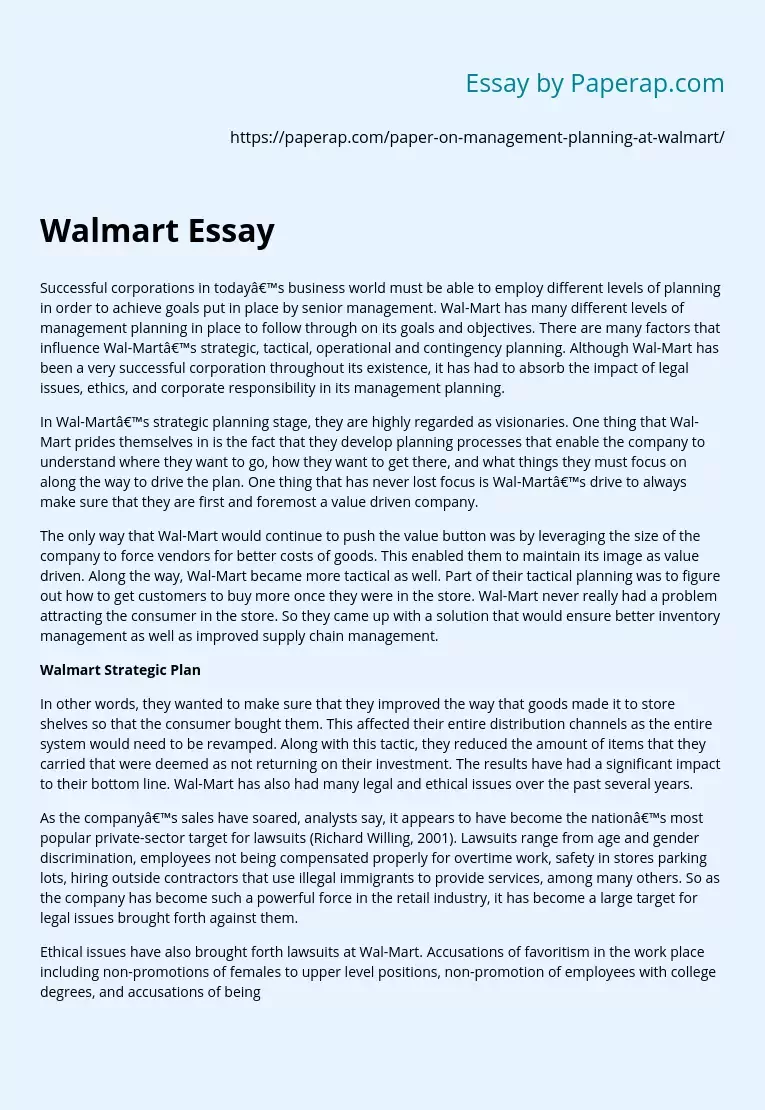Corporate Planning for Success
Successful corporations in today’s business world must be able to employ different levels of planning in order to achieve goals put in place by senior management. Wal-Mart has many different levels of management planning in place to follow through on its goals and objectives. There are many factors that influence Wal-Mart’s strategic, tactical, operational and contingency planning. Although Wal-Mart has been a very successful corporation throughout its existence, it has had to absorb the impact of legal issues, ethics, and corporate responsibility in its management planning.
In Wal-Mart’s strategic planning stage, they are highly regarded as visionaries. One thing that Wal-Mart prides themselves in is the fact that they develop planning processes that enable the company to understand where they want to go, how they want to get there, and what things they must focus on along the way to drive the plan. One thing that has never lost focus is Wal-Mart’s drive to always make sure that they are first and foremost a value driven company.
The only way that Wal-Mart would continue to push the value button was by leveraging the size of the company to force vendors for better costs of goods. This enabled them to maintain its image as value driven. Along the way, Wal-Mart became more tactical as well. Part of their tactical planning was to figure out how to get customers to buy more once they were in the store.
Wal-Mart never really had a problem attracting the consumer in the store. So they came up with a solution that would ensure better inventory management as well as improved supply chain management.
Walmart Strategic Plan
In other words, they wanted to make sure that they improved the way that goods made it to store shelves so that the consumer bought them. This affected their entire distribution channels as the entire system would need to be revamped. Along with this tactic, they reduced the amount of items that they carried that were deemed as not returning on their investment. The results have had a significant impact to their bottom line. Wal-Mart has also had many legal and ethical issues over the past several years.
As the company’s sales have soared, analysts say, it appears to have become the nation’s most popular private-sector target for lawsuits (Richard Willing, 2001). Lawsuits range from age and gender discrimination, employees not being compensated properly for overtime work, safety in stores parking lots, hiring outside contractors that use illegal immigrants to provide services, among many others. So as the company has become such a powerful force in the retail industry, it has become a large target for legal issues brought forth against them.
Ethical issues have also brought forth lawsuits at Wal-Mart. Accusations of favoritism in the work place including non-promotions of females to upper level positions, non-promotion of employees with college degrees, and accusations of being anti-union. All this indicates is that it puts Wal-Mart at the front of news reports that they engage in unethical activities. Corporate responsibility also affects management planning at Wal-Mart. Wal-Mart has a very good reputation for being corporate responsible.
Examples include their philosophy that they operate globally but always give back locally. In 2007, Wal-Mart gave 296 million dollars to charitable organizations across the United States. If you include donations from employees and customers, Wal-Mart gave away 470 million dollars globally. Areas in the communities that benefited from these donations include education, hunger relief, environmental sustainability, healthcare, disaster relief, military outreach, Salvation Army, among many others. Wal-Mart also has a green goal.
It claims that their environmental goal is to be supplied 100 percent by renewable energy, to create zero waste and to sell products that sustain our natural resources and the environment(Wal-Mart website 2008). Conclusion Wal-Mart is certainly credited with changing the retail world as we know it with its low prices and big stores with huge selections but it has come at a price. They have struggled with issues that question the ethics as a company and legal issues that question how they manage people. These issues will continue to hurt their organization unless a complete change in management thinking and actions are changed.
As a socially responsible organization, their management planning in this area is second to none. Lets hope they take the same effort in improving their image when it comes to ethics and legal issues. References Willing, R. (2001, August 13). Lawsuits a Volume Business at Wal-Mart. USA Today Retrieved April 28th, 2008 from: http://www. usatoday. com/news/nation/2001/08/14/walmart- usat. htm Sustainability- Wal-Mart website(2008). Retrieved April 28th, 2008 from: http://walmartstores. com/Sustainability/
Corporate Planning for Success. (2019, Dec 05). Retrieved from https://paperap.com/paper-on-management-planning-at-walmart/

